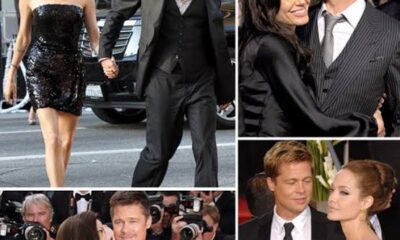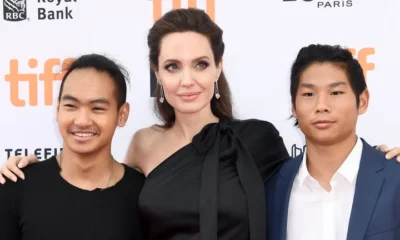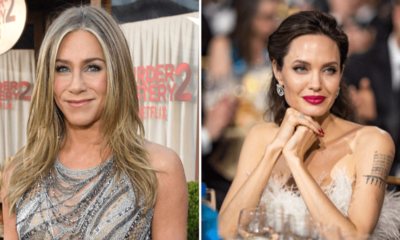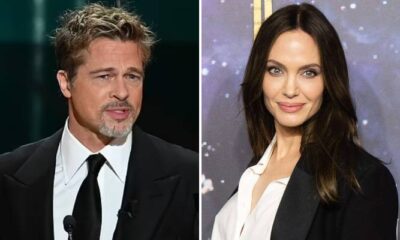CELEBRITY
Breaking: The Partnership: How Angelina Jolie Connected With Pablo Larraín To Make Beautiful Music in ‘Maria’: “It’s The Most Vulnerable I’ve Ever Felt…. See More
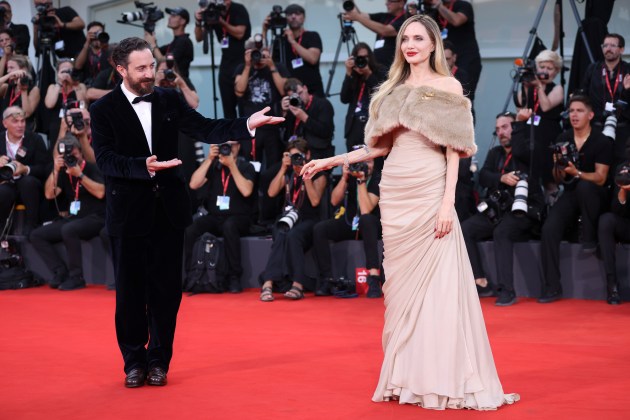
Angelina Jolie remembers the first time she was set to publicly embody the voice of prima donna assoluta Maria Callas in preparation for the Netflix film Maria. Her sons Maddox and Pax Jolie-Pitt stood watch protectively, like security. “I was so nervous,” Jolie recalls. “My boys guarded the doors.”
They were at a small theater in Greece, where, after months of singing lessons and vocal and breath coaching, Jolie would show filmmaker Pablo Larraín she was up to the task of portraying the famous arias associated with the legendary coloratura soprano. Callas died in 1977 and remains as popular now as when she was performing in great opera houses at the height of her fame in the 1950s and ’60s.
Like her boys, Larraín was protective of her too, ensuring a level of privacy a director usually reserves for shooting scenes of intense intimacy. Apart from him, only a handful of key crew was present that day: cinematographer, dolly, sound, a pianist and a singing teacher. No one else was allowed to enter the studio for Jolie’s first performance.
In her research, Jolie had watched a video of Callas giving a master class to students where she disclosed that discipline was the first principle. Callas taught, “Don’t think about the feeling, which is often what I start with,” Jolie says, “I’m a very emotional person.” But it was drummed into her, by Callas, almost reaching out from the past to guide her, to instruct her, really, to apply discipline first. Then, once the role and the music are understood, the other layers of feelings and emotion can be applied. That way, “You learn exactly what the composer intended, and only when you know that so perfectly well, can you add your personal feelings,” says Jolie.
She had wanted to work with Larraín for “the longest time”, but initially had gotten to know his work as an audience member when she saw his film Neruda several years ago. Every time a new Larraín movie came out — Jackie, Spencer, you name it — she watched it. “I saw everything he has made,” she says.
Much later, they met for coffee, which progressed to meals of Middle Eastern cuisine, then to ordered-in pizza at her home in Los Angeles. “I can’t cook,” Jolie says.
Larraín says that after observing each other closely, he decided to ask her if she would portray Maria Callas. She needed time to think it over, and mostly, that pause was because she was scared about singing. “It’s the most vulnerable I’ve ever felt,” she says.
Here, the pair share their journey with Baz Bamigboye in a conversation that began up in the mountains during the Telluride Film Festival and concluded in London.
ANGELINA JOLIE: Maybe, Neruda [Larraín’s 2016 film about Chilean poet Pablo Neruda]. And then I think it was just seeing them as I continued to watch his work, sometimes you see one thing, but as you watch a few things, you start to understand that even if the films are very different, there’s a language and there’s a consistency in a way he takes care of certain aspects of filmmaking.
JOLIE: It’s funny, I always probably put the working with somebody later. I think I was just looking at them as an audience member first, right? Yes. And I think like that, watching his films had an effect on me and that landed with me. And then yes, of course, then we met. And yeah, you just feel sometimes when you meet somebody, you get a sense that you’re like-minded and that there’s a trust there, because sometimes people can be the most amazing filmmaker, but not a very nice person, you know, to be very frank. Right?
PABLO LARRAÍN: Of course, same with actors [laughs].
JOLIE: And I’m not one of those people that can sacrifice one for the other, especially as an actor. If I am going to give all of myself and be open and vulnerable, I need to be with somebody who I think is, and who treats the crew well, who has an approach to life and work and family. All that is important because you’re so vulnerable and you’re giving so much of yourself that you want to have that. If you have that trust, then you can give them everything.
LARRAÍN: We met a couple of years before we discussed this project.
JOLIE: Maria was the last thing we got to. I mean, we really had spent a few years being around each other a little bit and having a little friendly relationship.
LARRAÍN: That was before the pandemic for sure. It might be 2018 or 2017. It was in Los Angeles.
JOLIE: Everybody came over to the house.
LARRAÍN: We had coffee once. And then we had coffee again, and then we had lunch. I remember with this sort of Middle East food which was very nice. And we had pizza.
LARRAÍN: Well, of course, by now we knew each other from these meetings before. And then what I remember is that before I even mentioned anything to Angie, we set up a screening of Spencer on the Paramount Lot. And then after that, I called her and I said, “Look, would you play Maria Callas?” That was the first time the subject had been broached. We were on the phone, and she said, “I need a couple of days to think about it.” And I was like, “OK, sure.” And then a couple of days after that we spoke and she said, “I’ll do it.” And after that, we hired Steve Knight [screenwriter]. From then on, it was like the chicken or the egg. It was always, in this case, I don’t think there’s a movie without Angie playing that role.
LARRAÍN: Well, there are a number of things, but I think the most important one is that I think after all these years of research reading, I think I read over nine or 10 biographies out of the 20 to 25 that are out there, I’d watched pretty much every documentary, read every interview. There was very extensive research. You get to understand that you really don’t know who she was. You think you do, but there’s a distortion in the public eye — the idea that, because that person has some form of exposure, because her work is so well known, that you could almost talk to her and know who she must be. I don’t think that’s what it is. I don’t think this is a proper biopic. That is an invention from culture. I don’t think a movie can actually capture anyone in reality, unless that person is in front of you talking to you.
But it captures an essence.
LARRAÍN: Of course that is the ambition, and I appreciate you thought that, but that process is different from the actual reality. You create an illusion that can capture the spirit of that person. But the reason why I think Maria is very hard to completely understand is because she had a very high level of mystery. She was someone that would choose when to share something and open herself and then when not to. And I think Angelina has that.
Angelina has mystery.
LARRAÍN: Yes, and can also play it and control it. So, even though she’s in 98% of the scenes of this film, I think, and when she’s not there, it is her younger self. So there is always a Maria, and even though the camera is very close, most of the time, she chooses when to let the audience in and when not. And that is the essence of cinema. So, the audience can complete it [by] looking. And I don’t want to make a movie that is just by myself or whoever is behind the camera. There’s always something that’s intriguing. So, the audience, they have an active job. And also, of course, there’s the basic necessity to have someone that could play that elegance, that could wear that fashion, that could be on that stage, that could create an intense magnetism.
Angelina, you get this phone call from Pablo. What is your immediate reaction to the idea of portraying Maria Callas?
JOLIE: Well, my first thought is, because I wanted to work with him so long, I was so happy that there was some potential to work together and that he was passionate about something. So anytime you have an artist you respect, and you like their work, and they’re passionate about something, it’s exciting. But I think the reality of her… I wanted a second to understand. I knew of her, I knew a bit of her music, but I wanted a few days to kind of look into her life and sit with the thought of, did I feel I could bring something to this? Because it’s a big responsibility to take on somebody’s life. And to feel that you are the right person to do it. I think I was nervous about this when I wasn’t 100% sure right away. And then of course, the singing wassomething that I hadn’t done. And so, it was just a big one to take on. But it was knowing that his intention… I felt, I just wasn’t 100% sure. And I think that’s the most exciting thing about being an artist, when you’re a little frightened and you’re not sure what it’s going to be, but you trust your partner and you want to try. And you care about the subject matter.
Layers, as I mentioned. You know, I said how important the singing is, it’s very challenging. It is not pop music. I have some ideas on how to do it. There’s this trainer here, there’s the other trainer there, and slowly go into the process. And I am not sure, I’m not going to speak for her because she’s here. But I am not sure if you were entirely aware of the size of the talent.
LARRAÍN: There you go. It was because you can’t cheat in opera. If you play, I don’t know, a record of any song from David Bowie or Taylor Swift, you name it, you can probably jump into the car, jump in the shower, or anywhere in your house, and you can sing along and do a decent job. Try that with opera. You just can’t track the melody because of the pitch of the voice. It’s very difficult. And particularly with Callas, who had this very famous sort of break up and down where it’s just very uneven, unevenly perfect.



